Singapore Management University
hideThis article has multiple issues. Please help or discuss these issues on the talk page. (Learn how and when to remove these template messages)
|
 | |
| Type | Autonomous university[1] |
|---|---|
| Established | 29 July 2000 |
| Chancellor | |
| President | Lily Kong |
| Provost | Timothy Clark |
Academic staff | 376[2] |
| Undergraduates | 8182[3] |
| Postgraduates | 1828[2] |
| Location | , Singapore 1°17′48″N 103°50′59″E / 1.29667°N 103.84972°ECoordinates: 1°17′48″N 103°50′59″E / 1.29667°N 103.84972°E |
| Campus | Urban; City campus |
| Colours | SMU blue and SMU gold |
| Website | www.smu.edu.sg |


Singapore Management University (SMU) is a public research university located in the Downtown Area of Singapore. It is the third autonomous university in Singapore. It was established on 29 July 2000.[4]
SMU was ranked in the 511-520 band in the world, #99 in Asia, and #11 compared to similar specialist universities in the 2021 QS World University Rankings.
It has a city campus enrolling about 10,000 undergraduate and postgraduate students and offers undergraduate and graduate degree programmes in business administration, business analytics, financial services, accountancy, economics, information systems management, law, and the social sciences. The university is organised into six schools, these include the School of Accountancy, the Lee Kong Chian School of Business, the School of Economics, the School of Computing and Information Systems, the Yong Pung How School of Law, and the School of Social Sciences. SMU has been awarded the Triple accreditation by AACSB International, EQUIS, and AMBA.
History[]
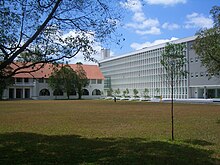
In 1997, the Singaporean government began considering setting up a third university in Singapore. Ho Kwon Ping, a Singaporean business entrepreneur, was appointed to chair the task-force which determined that the new institution would follow the American university system featuring a more flexible broad-based education. Following a review of undergraduate business schools to serve as a model for SMU, the Wharton School of the University of Pennsylvania emerged as the best candidate. The Wharton-SMU agreement was signed in February 1999 followed in June by the Wharton-SMU Research Center collaboration.
In July 1999, Janice Bellace, then Deputy Dean of the Wharton School of the University of Pennsylvania, commenced a two-year term as SMU's first president alongside founding provost, Tan Chin Tiong.[5] In 2000, SMU made its first home at the former Raffles College (now the National University of Singapore's Bukit Timah campus) on Evans Road near Hwa Chong Institution. The campus, first opened in 1929, had already been home to several institutions before SMU. In 2001, SMU upgraded and occupied the main campus facilities, balancing the need to refit and refurbish it with facilities while preserving the heritage of colonial architecture. From 2001 to 2004, Ronald Frank served as SMU's second president and was succeeded by Howard Hunter.[5]
Between 2000 and 2005, SMU saw the formation of four schools, its library and three centres of excellence as well as the graduation of the first batch of its students. After that, SMU moved from its Bukit Timah campus to its current campus in the Bugis-Bras Basah district. Since then, SMU has expanded, with the establishment of its School of Law in 2007 and the restructuring of its School of Economics and Social Sciences into two separate schools: the School of Economics and the School of Social Sciences.[6]
In 2010, Yong Pung How and Arnoud De Meyer took over the positions of SMU Chancellor and President from Richard Hu and Howard Hunter respectively.[7] and President[8] In 2015, J. Y. Pillay replaced Yong as SMU's Chancellor while Lily Kong succeeded De Meyer as SMU's President in January 2019. Lim Chee Onn succeeded J. Y. Pillay as Chancellor in August that year.
Academics[]
SMU follows a course credit system similar to that used in most American universities. Each individual course within the university is assigned a certain credit weightage and students are usually required to take a specified number of units to fulfill requirements for graduation. Courses are typically conducted as small group seminars of under 50 students so as to allow for a high degree of interactive discourse between students and instructors.
Admissions[]
SMU admits students from a list of pre-university or high school qualifications that includes the Singapore-Cambridge GCE Advanced Level, diplomas from the five polytechnics or two arts institutions[9] and International Baccalaureate diploma once a year.[10] For entry to graduate or master programmes, SMU requires GMAT and TOEFL or IELTS for most of the majors. Some majors also require submission of essays, recommendation letters, and a minimum of two years' work experience.[9]
Second Majors[]
SMU offers 43 second majors to undergraduates. Upon completion, they receive one degree certificate and a second major will be indicated in the result transcript.[11]
Double Degree[]
Undergraduates who are offered a double degree programme have 20 combinations to choose from. They can combine any of two disciplines: Accountancy, Business Management, Economics, Law, Information Systems Management or Social Sciences. Graduates will receive two degree certificates upon successful completion of the programme.[12]
Schools and programmes[]
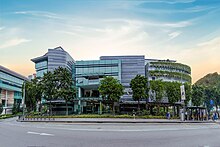
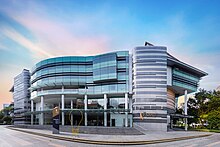
School of Accountancy[]
The School of Accountancy (SOA)[13] was launched in 2001 with the Bachelor of Accountancy (BAcc) undergraduate degree as its sole offering.
In 2005, the school launched the Master of Professional Accounting (MPA) programme for professionals without undergraduate accounting qualifications.[14]
Both the SMU MPA and BAcc are accredited with the Institute of Singapore Chartered Accountants (ISCA), Chartered Accountant of Singapore, the Accounting and Corporate Regulatory Authority (ACRA), CPA Australia, the Institute of Chartered Accountants in Australia (ICAA) and the Institute of Chartered Accountants in England and Wales (ICAEW).[15][16]
Lee Kong Chian School of Business[]
The Lee Kong Chian School of Business (LKCSB)[17] holds the status of being SMU's founding school, opening its doors to its pioneer batch of Bachelor of Business Management (BBM) students in August 2000.[18] The school was named after the philanthropist Lee Kong Chian.
The school offers the Master of Science in Applied Finance (China) programme, a collaborative effort between SMU and Wang Yanan Institute for the Study of Economics (WISE) at Xiamen University, and the Master of Science in Communication Management (MCM) in partnership with Università della Svizzera italiana (USI) and with 10 days spent at the UCLA Anderson School of Management. The newest programme offering the Master of Human Capital Leadership (MHCL) has been accredited by Chartered Institute of Personnel & Development and the students visit the Wharton School of the University of Pennsylvania for their overseas segment.
The School also offers a PhD in Business Programme with concentration in Finance,[19] Organisational Behaviour and Human Resources (OBHR), Marketing,[20] Strategy & Organisation, Operations Management, or General Management.[21]
School of Economics[]
The School of Economics (SOE)[22] was established in July 2002 as part of the then School of Economics and Social Sciences (SESS). Following restructuring, the university's economics faculty was separated from the social sciences to form a school of its own. This restructuring was largely accepted as a sound decision in view of the fact that SOE's curriculum had been modelled on that of the Wharton School of the University of Pennsylvania instead of following the traditional social science-type economics curriculum found at most other institutions.[23]
As of now, the SOE offers the Bachelor of Science (Economics) as well as Master of Science programmes in Economics and Applied Economics. In 2007, the School also introduced a PhD in Economics programme.[24]
School of Computing and Information Systems[]

The School of Computing and Information Systems (SCIS)[25] was first formed as the School of Information Systems (SIS)[26] with the aid of Carnegie Mellon University (CMU) when SMU and CMU forged a four-year strategic partnership intended to use the expertise of the CMU faculty in the school's initial establishment. Through this partnership, CMU aided SIS in establishing and developing the Bachelor of Science in Information Systems Management undergraduate programme, including the establishment of the flagship SMU-CMU Fast-Track programme, which enables SIS students to graduate within four-and-a-half years with both a bachelor's degree from SMU and a master's degree from CMU. In 2007, both universities agreed upon a four-year extension with CMU now providing support in the establishment and growth of SIS's postgraduate education offerings. Under this agreement, the two universities also increased their focus on collaborative research efforts leading to joint faculty research outputs, funded projects and graduate student interaction.[27]
SCIS offers the Master of Science in Information Systems, Master of IT in Business (MITB),[28] as well as the PhD in Information Systems programmes, in addition to its Bachelor of Science undergraduate offering.[29] The Master of IT in Business (MITB) augments its Analytics and Financial Services Analytics Tracks' offering with Harvard Business School's HBX Credential of Readiness (CORe) online programme. SMU is the first educational institution in the Association of Southeast Asian Nations (ASEAN) to incorporate HBX (CORe) into its master's programme.[citation needed]
In 2018, SCIS introduced the Bachelor of Science in Computer Science, followed by the Bachelor of Science in Computing & Law in the year after.[citation needed] In 2021, the school was branded to School of Computing and Information Systems, reflecting the larger focus on computer science, intensive programming and technology development in its offerings.[30]
Yong Pung How School of Law[]
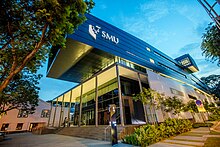
Originally named School of Law, the Yong Pung How School of Law (SOL) is SMU's smallest school with an annual intake of around 180 students.[31] The establishment of the SOL was announced in August 2007.[32] Previously, the SOL existed as the Department of Law under SMU's Lee Kong Chian School of Business, where it was chaired by Andrew Phang. Its current Dean is Goh Yihan, who succeeded in July 2017.
On 11 April 2021, SMU renamed the school to include former Chief Justice Yong Pung How's name as a recognition for his founding contributions to the university.[33][34]
The SOL offers the Bachelor of Laws (LLB) undergraduate programme, as well as an American-style Juris Doctor (JD) programme. The school also offers a Master of Laws (LLM) programme, with the option of a dual LLM with Queen Mary University of London.[35]
School of Social Sciences[]

The School of Social Sciences (SOSS)[36] was established in July 2002 as part of the then School of Economics and Social Sciences (SESS). Through a restructuring exercise in 2007, the School of Economics and School of Social Sciences were separated to form independent schools within SMU. The SOSS's primary offering is the Bachelor of Social Science, a multi-disciplinary undergraduate programme. Within this programme, three main majors are offered, namely political science, psychology and sociology.[6] In addition, the SOSS offers a PhD in Psychology.[37]

Institute of Innovation and Entrepreneurship[]
The Institute of Innovation and Entrepreneurship was established in 2009 and provides research, innovation and entrepreneurship training for the students of the university. In 2017, the institute launched Protégé Ventures, a student-run venture fund and training program.[38] The institute organizes a major startup business competition called the Lee Kuan Yew Global Business Plan Competition (LKYGBPC), which receives entries from a large number of international universities.[39][40] In 2020, the competition received submissions from over 650 universities.[41]
The tenth edition of the LKYGBPC launched the VC Office Hours, offering one-on-one consultations for founders by more than 30 senior partners from leading venture capital firms.[42] Another highlight of the tenth edition was the Changemakers Conversations, a series of virtual panel discussions centred around themes such as “Our New Normal” and “Growth in Asia”.[43]
SMU Academy[]
SMU Academy offers programmes for working professionals, to provide continuous lifelong education through diplomas and certificate programs. This includes a combination of practical industry knowledge and general management skills.[44]
Executive Development[]
In addition to its traditional academic programmes, the University also runs executive education and development[45] programmes for leaders at four stages of their career: emerging leaders, general managers, senior executives and corporate directors. These courses include Executive Skills for Board Members in Challenging Times; SNEF-SMU CEO Seminars: The Art & Science of Productivity Leadership; and Johnson & Johnson-SMU Hospital Management.
University rankings and accreditations[]
| University rankings | |
|---|---|
| Global – Overall | |
| QS World[46] | 511-520 |
| QS Employability[47] | 201-250 |
| QS Under 50[48] | 81-90 |
| Global – Business and economics | |
| QS Accounting[49] | 52 |
| QS Business[50] | 38 |
| QS Economics[51] | 60 |
| Global – Law | |
| QS Law[52] | 101-150 |
| Global – Liberal arts | |
| QS Social Sciences and Management[53] | 76 |
| Regional – Overall | |
| QS Asia[54] | 99 |
| National – Business and economics | |
| Financial Times MBA[55] | 58 |
SMU is the first university in Asia to be accredited by Ashoka, a global non-profit organisation supporting leading social entrepreneurs worldwide, as a Changemaker Campus as well as the first university in Singapore to be accredited as a research organisation by the Association for the Accreditation of Human Research Protection Programs, Inc. headquartered in Washington, D.C.[56][57] SMU's Lee Kong Chian School of Business is one of the youngest business schools in the world and the only Singaporean business school to achieve the 'triple crown' accreditation by the AACSB, AMBA, and EQUIS.[58]
QS World University Rankings
SMU made its debut on the Quacquarelli Symonds World University Rankings in 2017. [59][60] SMU is ranked #38 in the QS Business and Management Studies Subject, #52 in the QS Accounting Subject, #60 in the QS Economics Subject, #76 in the QS Social Sciences and Management Subject, and in the 101-150 band in the QS Law and Legal Studies subject. It's Master of IT in Business is ranked #1 in Asia and #14 in the world by QS Masters in Business Analytics Ranking for 2020[61]
Business school rankings
- SMU Lee Kong Chian School of Business was ranked #58 worldwide and #13 in Asia in the Financial Times' 2021 global ranking of Master of Business Administration (MBA) programmes.[62]
- SMU Lee Kong Chian School of Business was ranked #76 worldwide and #8 in Asia in the Financial Times’ 2020 global ranking of Masters in Management (MiM) programmes.[63]
- SMU Lee Kong Chian School of Business was ranked #6 in the 2018 Financial Times Top 25 Business Schools: Asia-Pacific region.[64]
- SMU Lee Kong Chian School of Business' Executive Master of Business Administration (EMBA) was ranked #22 worldwide by The Financial Times .[65]
- SMU Lee Kong Chian School of Business was rated as a 4 Palmes business school and ranked second in Singapore and fourth in the Far East Asia Zone among 200 business schools ‘with significant international influence’ in the ‘Best 1,000 Business Schools in 154 countries’ ranking compiled by Eduniversal for 2020[66]
Research rankings
- SMU Lee Kong Chian School of Business' research productivity in top ranked journals across all fields of business in 2016-17 is #13 worldwide according to the University of Texas Dallas ranking.[67]
- SMU Lee Kong Chian School of Business' research productivity in top ranked journals in management field in 2016-17 is #2 worldwide according to the University of Texas Dallas ranking [67]
- SMU School of Accountancy was ranked #1 in Asia and #3 in the world for both Archival Research (All Topics) and Archival Research (Financial). It also ranks #1 in Asia for All Areas, All Disciplines according to the Brigham Young University Accounting Research Rankings 2016 [68]
- SMU was ranked #64 worldwide and #4 in Asia in the 2016 Tilburg University Top 100 Worldwide Economics Schools Research Ranking based on research contributions in leading international journals in the preceding five-year period[69]
- USNEWS ranks SMU's Economics and Business faculty as 77 globally.[70]
SMU Libraries[]
The SMU Libraries[71] consists of the Li Ka Shing Library and the Kwa Geok Choo Law Library. The Li Ka Shing Library was officially opened on 24 February 2006.[72]
Institutional Knowledge (InK)[]
InK,[73] Institutional Knowledge at SMU is the institutional repository and archives of the Singapore Management University. It acquires, organises and provides access to the research and scholarly works of SMU faculty. Collections in InK include journal articles, working papers, conference proceedings, books, book chapters, reports and other research works including the dissertations and theses of postgraduate students and a collection of print and video teaching cases. In addition, there are also the heritage and research data collections.
Campus and facilities[]
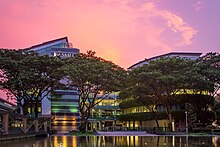
The campus has eight blocks:
- Lee Kong Chian School of Business
- School of Accountancy
- Li Ka Shing Library
- School of Information Systems
- School of Economics / School of Social Sciences
- School of Law & Kwa Geok Choo Law Library
- SMU Connexion
- Administration Building
Six of the buildings are connected by an underground walkway known as the Concourse, which is open to the public and lined with shops. The campus was designed by two teams of architects, with Cox Architects and Planners and DEG Architects in charge of the Administrative Building, and Edward Cullinan Architects and KNTA Architects designing the rest.[74]
Teaching facilities include seminar rooms, classrooms, computer labs and group study rooms used by students for project discussions. There are research facilities scattered throughout the university. Sports facilities are limited on campus because of space constraints; however, the university has a swimming pool, gymnasium and a multi-purpose sports hall which is equipped with a rock wall.[75] The University has campus-wide wireless LAN networks.
The most recent building on campus is the School of Law, which officially opened in March 2017. A key feature integrated into the new building is the Kwa Geok Choo Law Library, named in memory of lawyer Kwa Geok Choo, who was also the wife of Singapore's first Prime Minister Lee Kuan Yew. The 2,600 square-metre Kwa Geok Choo Law Library takes on a distinct architectural form that is reminiscent of a pearl. It seats more than 500 people and is fully equipped with modern technology. Within the School of Law building, there is the David Marshall Moot Court, the SMU Pro Bono Centre and other research centres.[76]
The university had leased the former MPH Building, which housed the former flagship store of MPH Group until 2003, located at the junction of Stamford Road and Armenian Street from mid 2015 to mid 2019[77] to house SMU Labs. This provided collaborative learning spaces for the university's latest learning experiment, known as SMU-X, in which lessons are centred on solving real-world problems through projects.[78] The new SMU Connexion building, built to link the School of Law and School of Accountancy, opened in 2020 as a permanent home to SMU-X and SMU Labs.[79]
Notable alumni[]
- Adithya Srinivasan - Singer
- Chantalle Ng - Actress
- Jade Seah - Actress
- Jason Goh Koon-Jong - Chess player
- Louis Chua Kheng Wee - Member of Parliament
- Nadia Ahmad Samdin - Member of Parliament
- Poh Seng Song - Athlete
- Pornsak Prajakwit - Television personality
- Pritam Singh - Member of Parliament
- Rebecca Lim - Actress
- Russell Ong - Swimmer
- Yip Pin Xiu - Swimmer
- Zhulkarnain Abdul Rahim - Member of Parliament
- Tania Singh - CEO of Make Love Not Scars
References[]
- ^ "Post-secondary education". Ministry of Education, Singapore. Ministry of Education, Singapore. Archived from the original on 5 April 2008. Retrieved 11 June 2015.
- ^ Jump up to: a b "Facts". Singapore Management University (SMU).
- ^ "Quick facts" (PDF). Singapore Management University. 18 September 2017. Archived (PDF) from the original on 17 January 2018. Retrieved 14 December 2015.
- ^ "Singapore Management University is established". National Library Board. Retrieved 11 June 2018.
- ^ Jump up to: a b "History | Singapore Management University". SMU. 12 October 2012. Archived from the original on 25 September 2012. Retrieved 20 November 2012.
- ^ Jump up to: a b "About the School | School of Social Sciences". Socsc.smu.edu.sg. 23 August 2012. Archived from the original on 10 October 2012. Retrieved 20 November 2012.
- ^ "31 August 2010". Smu.edu.sg. Archived from the original on 6 September 2010. Retrieved 20 November 2012.
- ^ "11 August 2010". Smu.edu.sg. Archived from the original on 20 August 2010. Retrieved 20 November 2012.
- ^ Jump up to: a b "Students with International Qualifications". Singapore Management University (SMU). Archived from the original on 2 February 2017.
- ^ "SMU Admissions Website". SMUAdmissions. Archived from the original on 14 May 2013. Retrieved 9 May 2013.
- ^ "SMU Admissions Website". SMUAdmissions. Archived from the original on 14 May 2013. Retrieved 13 May 2013.
- ^ "Archived copy". Archived from the original on 21 May 2013. Retrieved 13 May 2013.CS1 maint: archived copy as title (link)
- ^ "SMU School of Accountancy – Singapore Management University – SMU". Accountancy.smu.edu.sg. Archived from the original on 12 December 2012. Retrieved 20 November 2012.
- ^ "SMU offers master's in accounting courses" (PDF). Today newspaper. 19 September 2005. Archived (PDF) from the original on 3 September 2011. Retrieved 28 May 2009.
- ^ "Auto-redirection". Accountancy.smu.edu.sg. Archived from the original on 28 May 2009. Retrieved 20 November 2012.
- ^ "About the Programme > Programme Overview". Accountancy.smu.edu.sg. 15 June 2011. Archived from the original on 28 May 2009. Retrieved 20 November 2012.
- ^ "Welcome to Lee Kong Chian School of Business". Singapore Management University – SMU. Business.smu.edu.sg. Archived from the original on 15 December 2006.
- ^ "About SMU Lee Kong Chian School of Business". Business.smu.edu.sg. Archived from the original on 29 October 2012.
- ^ "Overview & Programme Goals". Archived from the original on 21 July 2015. Retrieved 17 July 2015.
- ^ "Overview & Programme Goals". Archived from the original on 21 July 2015. Retrieved 17 July 2015.
- ^ "Overview & Programme". Archived from the original on 21 July 2015. Retrieved 17 July 2015.
- ^ "School of Economics (SMU)". Singapore Management University – SMU. Economics.smu.edu.sg. Archived from the original on 25 April 2007.
- ^ The University of Pennsylvania offers two economics bachelor degrees. The BSc Economics is designed as a business-focused programme and is offered by the university's Wharton School while the University of Pennsylvania College of Arts and Sciences offers the more traditional social science-focused economics programme.
- ^ "Graduates Going Places". Economics.smu.edu.sg. Archived from the original on 9 June 2009. Retrieved 20 November 2012.
- ^ "Home | School of Computing and Information Systems (SMU)". scis.smu.edu.sg. Retrieved 15 January 2021.
- ^ "Home". School of Information Systems (SMU). Singapore Management University – SMU. Archived from the original on 14 April 2006.
- ^ "Academic Partnerships". Sis.smu.edu.sg. 11 April 2011. Archived from the original on 8 July 2009. Retrieved 20 November 2012.
- ^ "Singapore Master of IT in Business SMU". Mitb.sg. Archived from the original on 13 September 2017. Retrieved 20 November 2012.
- ^ "{title}". Archived from the original on 28 May 2009. Retrieved 28 May 2009.
- ^ Luqmanul Hakim Ismail (15 January 2021). "SMU's rebranded IT school will have greater focus on computing and coding". The Straits Times. Retrieved 15 January 2021.
- ^ "SMU Notification of Grade Profiles 2008" (PDF). Smu.edu.sg. Archived (PDF) from the original on 7 April 2009. Retrieved 20 November 2012.
- ^ "Setting Tomorrow's Direction" (PDF). 8 April 2009. Archived from the original (PDF) on 8 April 2009.
- ^ Curator, Litigation Edge. "SMU To Rename Law School After Singapore Chief Justice Yong Pung How". Retrieved 25 April 2021.
- ^ Lum, Selina (9 April 2021). "SMU law school renamed after ex-CJ". The Straits Times. Retrieved 25 April 2021.
- ^ "SMU and Queen Mary University of London offer innovative Master of Laws to train legal talents in cross-border commercial law". Archived from the original on 20 March 2017. Retrieved 20 March 2017.
- ^ "Welcome to School of Social Sciences – Singapore Management University – SMU". Socsc.smu.edu.sg. Archived from the original on 10 May 2007. Retrieved 20 November 2012.
- ^ "Welcome to School of Social Sciences – Singapore Management University – SMU". Socsc.smu.edu.sg. Archived from the original on 30 April 2013. Retrieved 13 May 2013.
- ^ Tay, Samantha. "New Venture Set To Groom Uni Students In S'pore Into VCs - Gives Them $20k To Play With". Vulcan Post. Retrieved 11 July 2017.
- ^ "Singapore's calling all start-ups". Bangkok Post.
- ^ "Million dollars up for grabs at 10th Lee Kuan Yew Global Business Competition". www.bworldonline.com. Business World.
- ^ "Chitkara University Selected in Elite 150 at Asia's Most Exciting Startup Competition LKYGBPC 2020 (Global Innovation Competition), Organized by Singapore Management University | Indian Education News". Indian Education News.
- ^ "Singapore's SMU announces winners of its startup competition". KrASIA. 19 March 2021. Retrieved 28 July 2021.
- ^ Tan, Elysia (19 March 2021). "Greater focus on innovation crucial for Singapore's future: DPM Heng". The Business Times. Retrieved 28 July 2021.
- ^ "Professional Programmes - Programmes - SMU". Archived from the original on 21 July 2015. Retrieved 17 July 2015.
- ^ "{title}". Archived from the original on 21 January 2013. Retrieved 5 February 2013.
- ^ "QS World University Rankings 2021". Quacquarelli Symonds. Retrieved 25 April 2021.
- ^ "QS Employability Rankings 2020". Quacquarelli Symonds. Retrieved 25 April 2021.
- ^ "QS Top 50 under 50 Rankings 2021". Quacquarelli Symonds. Retrieved 25 April 2021.
- ^ "QS Subject Rankings 2021". Quacquarelli Symonds. Retrieved 25 April 2021.
- ^ "QS Subject Rankings 2021". Quacquarelli Symonds. Retrieved 25 April 2021.
- ^ "QS Subject Rankings 2021". Quacquarelli Symonds. Retrieved 25 April 2021.
- ^ "QS Subject Rankings 2021". Quacquarelli Symonds. Retrieved 25 April 2021.
- ^ "QS Subject Rankings 2021". Quacquarelli Symonds. Retrieved 25 April 2021.
- ^ "QS Asia Rankings 2021". Quacquarelli Symonds. Retrieved 25 April 2021.
- ^ "FT Global MBA Ranking 2021". Financial Times. Retrieved 25 April 2021.
- ^ "Campuses". Ashoka U. Retrieved 17 October 2018.
- ^ "AAHRPP Accredits Research Organizations in U.S., Singapore" (PDF).
- ^ "Triple Accreditation". Singapore Management University. Retrieved 25 April 2021.
- ^ "SMU Facts Overview". Singapore Management University. Archived from the original on 19 June 2018. Retrieved 27 December 2017.
- ^ "Singapore Management University". Top Universities. 16 July 2015. Retrieved 1 October 2020.
- ^ "QS Business Masters Ranking". 28 September 2019.
- ^ "FT Global MBA Ranking 2021". Financial Times. Retrieved 25 April 2021.
- ^ "FT Global MiM Ranking 2020 - FT.com". rankings.ft.com. Retrieved 9 October 2020.
- ^ Moules, Jonathan (2 December 2018). "FT 2018 Americas and Asia-Pacific top 25 business school rankings". Financial Times. Retrieved 20 December 2018.
- ^ "Business school rankings from the Financial Times - FT.com". rankings.ft.com. Archived from the original on 21 January 2018. Retrieved 16 October 2017.
- ^ "University and business school ranking in 4 Palmes". Archived from the original on 23 June 2015. Retrieved 25 April 2021.
- ^ Jump up to: a b "LKCSB Research Productivity worldwide ranking". UT Dallas. Archived from the original on 13 March 2017. Retrieved 13 March 2017.
- ^ "Brigham Young University Accounting Research Rankings 2016". Brigham Young University. Archived from the original on 4 May 2017. Retrieved 17 April 2017.
- ^ "Tilburg University Economics Ranking – Tilburg University". Econtop.uvt.nl. Archived from the original on 7 September 2012. Retrieved 20 November 2012.
- ^ "SMU". USNEWS. Archived from the original on 5 February 2018. Retrieved 27 December 2017.
- ^ "Singapore Management University Libraries". Archived from the original on 12 July 2015. Retrieved 17 July 2015.
- ^ "Li Ka Shing Library | SMU Libraries". library.smu.edu.sg. Retrieved 2 February 2021.
- ^ "InK@SMU.edu.sg". Archived from the original on 21 July 2015. Retrieved 17 July 2015.
- ^ "Campus Information". Smu.edu.sg. Archived from the original on 1 February 2009. Retrieved 20 November 2012.
- ^ "Overview". Smu.edu.sg. 22 March 2010. Archived from the original on 2 March 2008. Retrieved 20 November 2012.
- ^ "Ground-breaking of new building for SMU School of Law". Archived from the original on 21 July 2015. Retrieved 17 July 2015.
- ^ migration (21 December 2014). "Former MPH building now learning lab for SMU students". The Straits Times. Retrieved 25 September 2019.
- ^ "Why SMU - Innovative Curriculum". admissions.smu.edu.sg. Archived from the original on 2 October 2015. Retrieved 1 October 2015.
- ^ hermesauto (27 August 2018). "New green building to help SMU students with hands-on learning, connect better with industry". The Straits Times. Retrieved 25 September 2019.
External links[]
| Wikimedia Commons has media related to Singapore Management University. |
- Singapore Management University
- 2000 establishments in Singapore
- Autonomous Universities in Singapore
- Educational institutions established in 2000
- Education in Singapore
- Museum Planning Area
